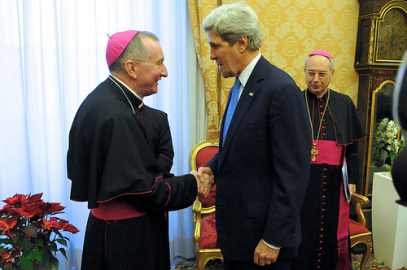
Kerry to Vatican: Help free Alan Gross

By Reuters and DPA
U.S. Secretary of State John Kerry on Tuesday asked the Vatican to help win the release of a Jewish-American contractor Alan Gross who has been in a Cuban jail since 2009.
Kerry, the first Catholic U.S. secretary of state in more than 30 years, stopped at the Vatican on his way to Kuwait to hold talks with Pope Francis’ top aide, Secretary of State Archbishop Pietro Parolin.
The talks mostly centered on the Middle East and efforts to bring an end to the Syrian civil war ahead of a peace conference in Geneva later this month.
“We talked also about Cuba and the need for respect for freedom of religion and freedom of, and respect for, human rights,” Kerry told reporters after the meeting.
“I raised the issue of Alan Gross and his captivity, and we hope very much that there might be able to be assistance with respect to that issue,” he said.
Gross was sentenced to 15 years in prison for installing Internet networks for Cuban Jews in a U.S. program that Cuba considers subversive.
The Vatican has relatively good diplomatic relations with Cuba. Former Pope Benedict and the late Pope John Paul both made major visits there.
The Gross case is a “crucial point” in restoring ties between the United States and Cuba, a State Department spokesman said last Friday in Havana.
“We remain deeply concerned for his well-being,” said Edward Alex Lee, acting deputy assistant secretary of state for Western Hemisphere affairs, who was on a visit to discuss bilateral migration issues. Lee added that he had met with Gross while in Havana, but he gave no further details of the visit, which he described as private.
Gross’ family have said his health is not good and have demanded his release for humanitarian reasons. Washington demands his unconditional release, while Havana wants the release of four Cuban intelligence agents held in the United States since 1998.
Lee’s presence in Havana was the latest sign of a new collaborative spirit between the Cold War foes. The migration talks are the highest public contact between the two governments, which do not have diplomatic relations, and recent meetings have been increasingly constructive, officials say.
(From Haaretz)

